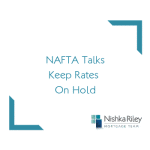
No Increase With NAFTA On The Ropes
September 5, 2018
Credit Score – The Rules Have Changed
September 25, 2018With the significant changes in the mortgage rules since 2016, I thought it would be a good idea to go back to the basics and talk about the key ingredients in applying for a mortgage. Sounds riveting right? Yep, I’d thought you’d say that! But before you click away to that cat video, I promise to make this interesting – and more importantly quick.
Back in the day (before the internet) when I was a young girl eagerly “learning credit” I was taught a framework which determined if a person would qualify for a mortgage. This framework, which the bank had been using for over 50 years put a weighting of 1/3 on each of the key pillars (credit, income and net worth) in your application. Fast forward to today with the new government mortgage rules and that weighting has dramatically changed. It’s catching a lot of people off guard and making for some very difficult conversations.
So what’s the secret weighting that will make the bank open the vault? As a general rule the 1/3 weighting has now changed to 50 per cent weighting on your credit score, 35 per cent weighting on your income and 15 per cent on your net worth. It’s important to note that I didn’t say credit, as in how well you manage your credit, but your score. The difference is subtle but significant and needs its own blog post to be explained. Also, I don’t want to break my promise of making this post a quick read!
So why the change in the weighting? The quick answer is back in 2016 the government changed three things 1. how banks can fund their mortgages 2. imposed rules on how the banks could make credit decisions 3. added significant fines for not following the first two rules. For the banks, it’s the business equivalent of going on a first date with a parent chaperoning you. The result: Canada’s banks that were already conservative are now even more anxious when lending you money.
So now that we are stuck in this new mortgage reality, what are three things you can do if you are thinking of applying for a mortgage?
Plan ahead:
- have a consultation with an experienced mortgage professional at least four months prior to when you actually will need a mortgage. This gives you a chance to fix any issues before your application gets submitted to a lender
Know how your credit score works:
- Paying your bills on time isn’t enough anymore. The algorithm that determines your credit score was re-written in 2017 and it does have some flaws. With a few simple changes, your score can be improved in a matter of weeks.
Before you make any changes to your employment talk to an experienced mortgage professional:
- It sounds straightforward, but in this modern corporate world, changing your employment structure from employee to incorporated consultant may look great at tax time, however it could lock you out from borrowing money for two years since you are now viewed as a self-employed person.
Like anything, a little planning may require a bit of extra effort up front, but it will pay huge dividends down the road. I like to say to my clients: to thrive in today’s new reality of mortgage financing, you need to think of your financial strength like baking a cake – the key ingredients need to be mixed in the right ratios, in the right order at the right time, otherwise it ain’t going to rise.
By the way…did I mention I’m excellent baker 😉





